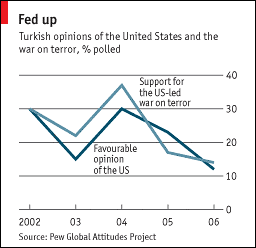 The Democrats, for once, have done the Syrians and the Iranians a favor. Anything that further alienates Turks from Washington1 is good for Syria and Iran, and the Armenian genocide resolution manages to anger Turks nearly across the political spectrum (rightists object on nationalist grounds, leftists object on anti-imperialist grounds).
The Democrats, for once, have done the Syrians and the Iranians a favor. Anything that further alienates Turks from Washington1 is good for Syria and Iran, and the Armenian genocide resolution manages to anger Turks nearly across the political spectrum (rightists object on nationalist grounds, leftists object on anti-imperialist grounds).The AKP, in any event, has been improving Turkey's relations with Iran and Syria for some time. Ankara, Damascus, and Tehran are united in opposition to the US backing of Kurds.2 The Turks, whose country is a NATO member, have the most freedom among them to threaten the Kurdish guerrillas and terrorists in Iraq, which indirectly benefits Iran and Syria, especially if the Turks can do so without undermining Iran's Kurdish friends.3 The AKP has also deepened Turkey's energy ties with Iran (especially the Nabucco gas pipeline) and Russia (especially the Blue Stream pipeline and the Blue Stream Two extension), having them compete with each other. By doing so, the AKP has smartly positioned Turkey as the key player in the energy networks that link Europe, Russia and its Central Asian periphery, and Iran.
That all these actions have been taken by a political party strongly backed by not just European but also American ruling classes (as you recall the Western media's largely positive coverage of the AKP during the Turkish elections this year) in a country that has been one of the most important links in the US-led multinational empire in the Middle East, overriding Washington's strong objections, says a lot about the decline of US hegemony.
The Iraq War, as well as the weakening dollar hegemony, is indeed beginning to give birth to a new Middle East -- just not the kind that Trotskyist-turned-neo-conservative revolutionaries had wished for.
1 Even before the resolution became an issue, most Turks had become profoundly alienated from the US and the EU:
Turkish feelings toward the United States and European Union have continued to cool, with warmth toward the United States dropping from 20 degrees in 2006 to 11 in 2007 on a 100-point thermometer scale, and from 45 degrees to 26 toward the European Union. . . .
Turkish respondents continued to have the most critical views of U.S. and EU leadership in world affairs, with 74% of Turkish respondents who viewed U.S. leadership in world affairs as undesirable, an increase of five percentage points since 2006. For the first time, a majority (54%) also viewed EU leadership as undesirable, an increase of seven percentage points since 2006. Similarly, only three percent approved of President Bush's handling of international policies and 83% disapproved.
. . . . . . . . . . . . . . . . . . . .
Turkish support for NATO has continued its decline since 2004, with Turkish respondents divided almost equally: 35% of respondents (–9 percentage points from last year) agreed that NATO is still essential for their country's security, while 34% said it is no longer essential, and 31% did not know or refused to answer. (German Marshall Fund, "Transatlantic Trends: Key Findings 2007,", pp. 21-22)
2 PEJAK's base area is said to be the same as its sister party PKK's.
3 The AKP has to be also careful about two domestic risks in its confrontation with the PKK: empowering the Kemalist military establishment; and alienating Kurdish voters, an increasing number of whom have voted for the party. However, it is said that the PKK itself had already lost many of its erstwhile supporters and sympathizers: Sabrina Tavernise, "As Kurds’ Status Improves, Support for Militants Erodes in Turkey," New York Times, 2 November 2007.
Updated on 3 November 2003.




No comments:
Post a Comment